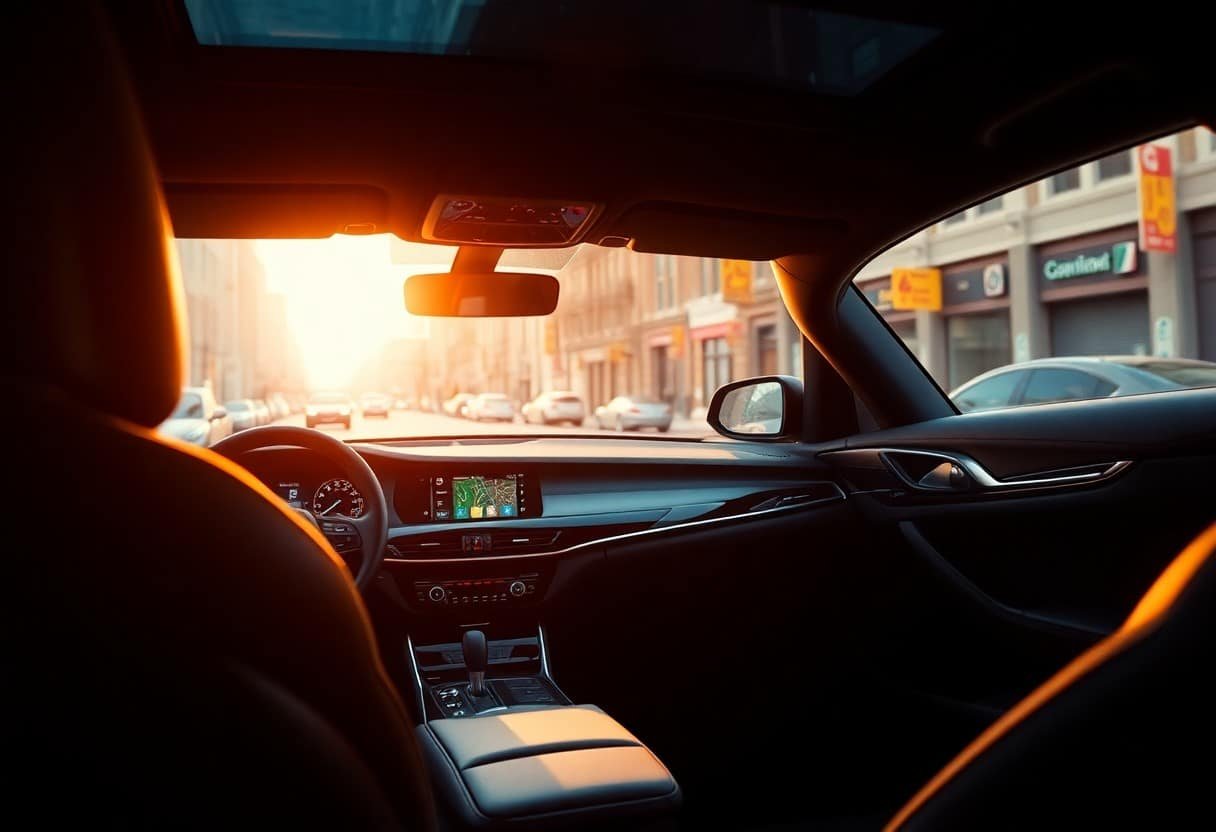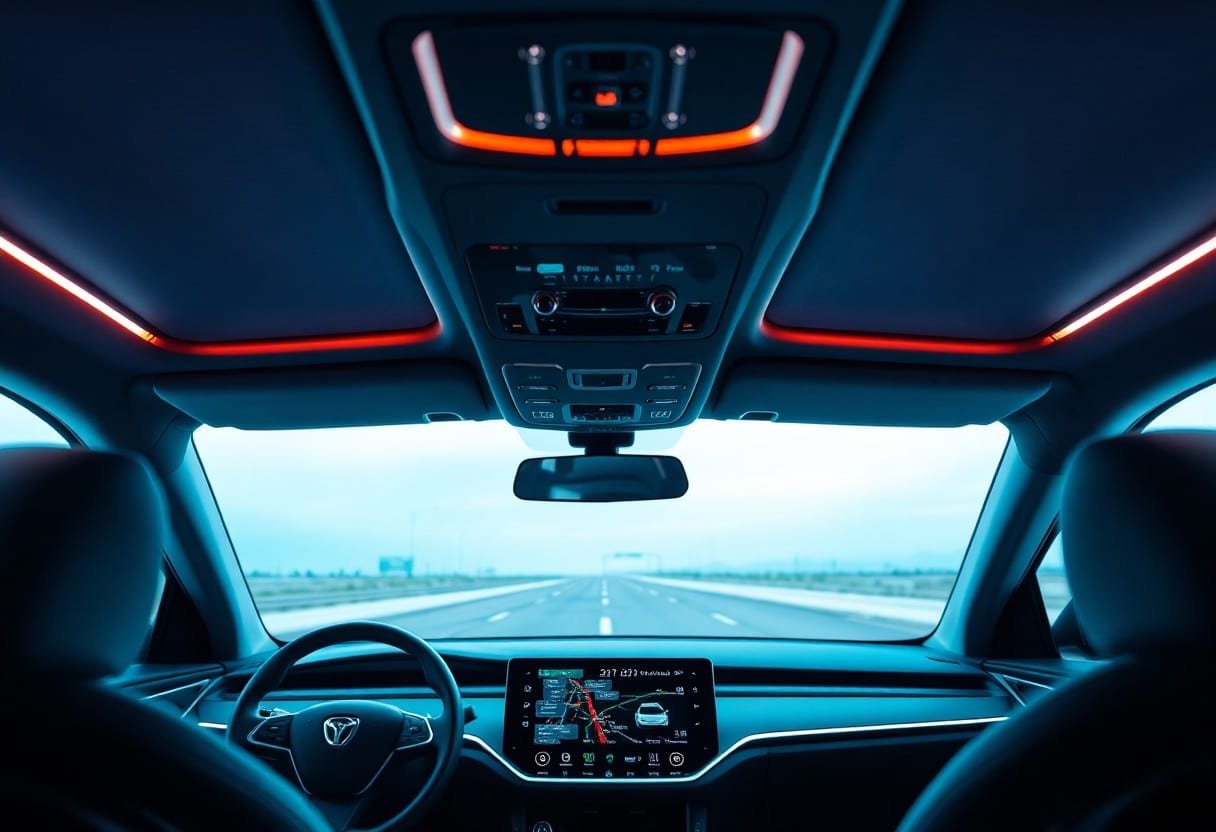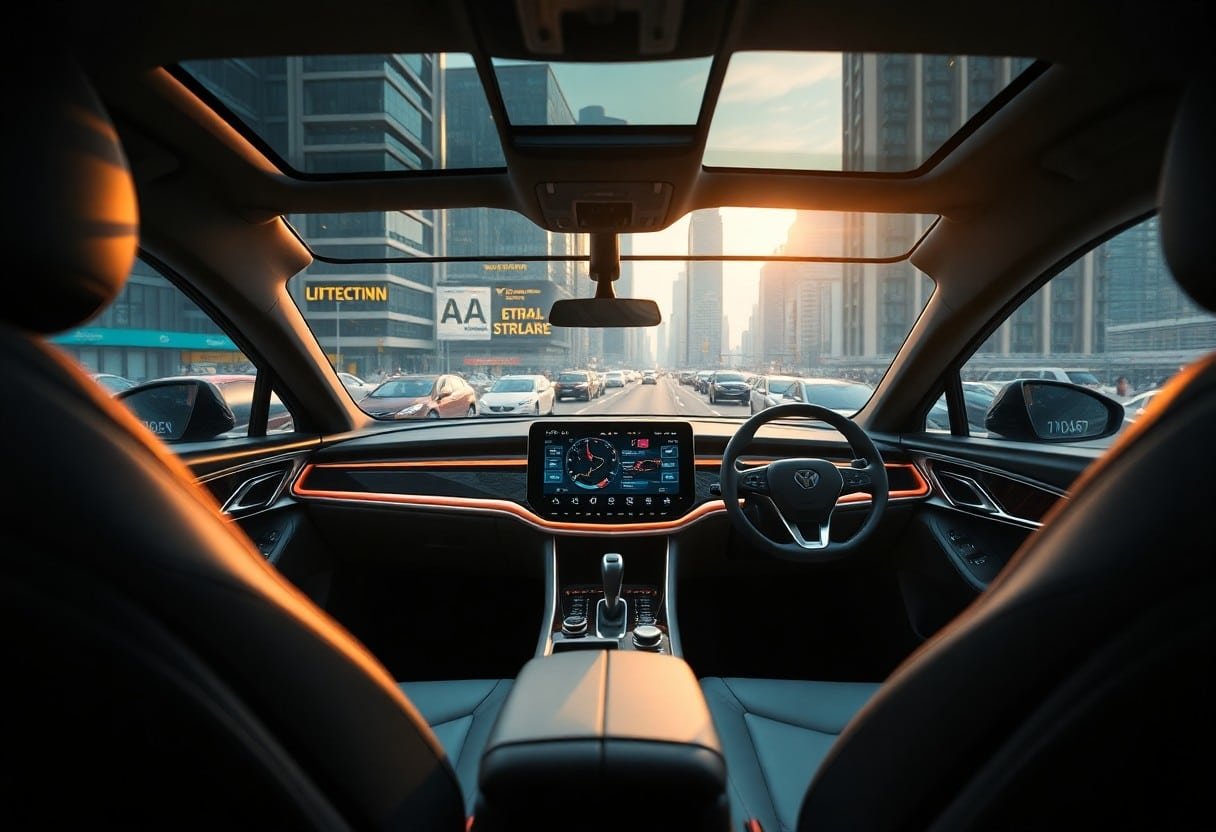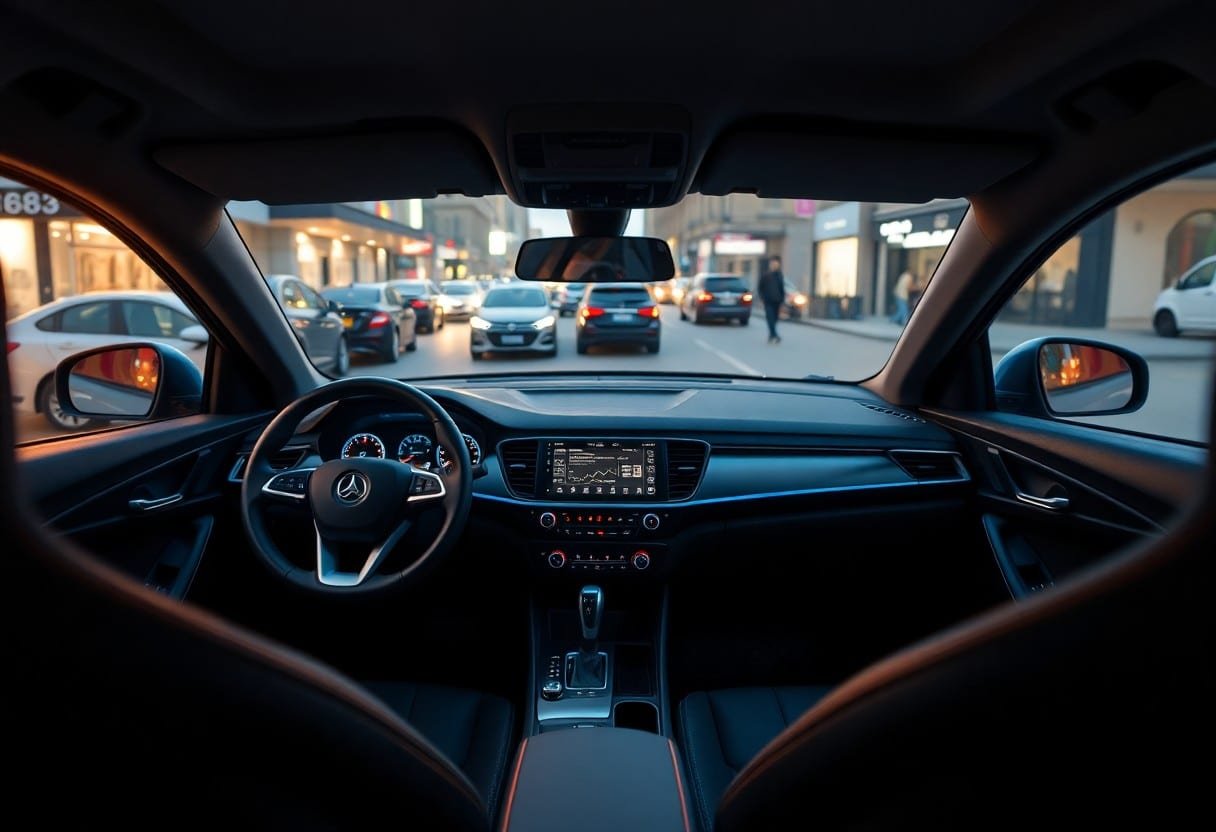Most drivers today are experiencing a transformative shift in how cars cater to individual needs through AI-enabled car cabins. These innovations enhance your driving journey by seamlessly adapting to your preferences, from climate control to entertainment options. As connected cars become smarter, you’ll discover how personalized experiences can make your time on the road more enjoyable and efficient. Dive into the world of these advanced technologies and learn how they can elevate your driving experience like never before.
Key Takeaways:
- AI enhances in-car personalization by adapting to driver preferences and habits, improving comfort and convenience.
- Connected cars utilize data analytics to offer tailored driving experiences, including route optimization and entertainment options.
- Emerging technologies in AI and connectivity enable seamless interactions between drivers and car systems, fostering a more intuitive user experience.
The Evolution of In-Car Technology
In-car technology has rapidly advanced from basic radio and cassette players to sophisticated infotainment systems that seamlessly integrate with your digital life. The introduction of satellite radio and GPS marked significant milestones, paving the way for features that now involve real-time traffic updates, voice commands, and smartphone connectivity. With every new model year, manufacturers prioritize connectivity, leading to a significant shift towards creating personalized driving experiences.
A Brief History of Connected Cars
The journey of connected cars began in the late 1990s with the introduction of telematics systems, offering basic vehicle tracking and diagnostic capabilities. The early 2000s saw the development of more interactive features, such as GPS navigation and emergency call services. By the 2010s, automakers integrated smartphone technologies, allowing for hands-free calling and music streaming, setting the stage for the highly connected vehicles you see today.
The Role of AI in Automotive Innovation
AI is revolutionizing the automotive industry by enhancing driving experiences and vehicle performance. With its ability to analyze large data sets, AI helps optimize routes, predict maintenance needs, and personalize in-car environments based on your preferences. As self-driving technology advances, AI not only improves navigation and safety but also provides insights into driver behaviors, promoting safer and more efficient driving practices.
AI’s influence reaches beyond the technical aspects; it personalizes interaction with your vehicle. For instance, predictive algorithms gauge your driving patterns and adjust vehicle settings, from climate control to seat positioning. Notable implementations like Tesla’s Autopilot utilize AI to learn from millions of miles driven, refining their systems continuously. This level of personalization enhances comfort while promoting safer interactions with the vehicle, making your driving experience uniquely tailored to you.

Personalized Driving Experiences
Your driving experience can now be tailored to your individual needs, enhancing comfort and convenience. As AI technology evolves, vehicles analyze your habits and preferences, creating a truly personalized journey. From seat adjustments to climate control, every aspect of the cabin environment can be optimized just for you, making each drive more enjoyable and efficient.
Understanding User Preferences
AI systems gather data from your driving history, frequently visited locations, and even the music you listen to. This information allows your car to anticipate your needs, suggesting optimal routes and preferred settings before you even step inside. By recognizing patterns in your behavior, the vehicle ensures that every trip is seamless and tailored to your lifestyle.
Customizing Environment and Entertainment
Focusing on your comfort, connected cars adjust lighting, climate, and entertainment options to match your mood or activity. With voice commands or touch controls, you can switch from an energetic playlist to a calming ambiance with ease, making your ride conducive to relaxation or productivity.
AI-driven systems allow for an immersive experience, where you can curate an in-car environment that suits your preferences in real-time. For instance, if you prefer cooler temperatures while listening to upbeat music during a morning commute, your vehicle can preset these changes automatically based on the time of day. Features like ambient lighting, seat position adjustments, and infotainment settings transform your cabin into a personalized sanctuary, catering to both your mood and needs in any situation.

Safety and Security Enhancements
AI integration in car cabins not only elevates driving comfort but also significantly boosts safety and security. Real-time data processing allows vehicles to predict and mitigate hazards, ensuring your journey is safeguarded. Advanced sensors and camera systems continuously monitor the environment, assisting emergency braking and collision avoidance systems. Additionally, AI systems can analyze driver behavior, promptly notifying you of any risky patterns, enhancing your overall safety on the road.
AI-Powered Assistive Features
AI-powered assistive features act as co-pilots during your drives, streamlining navigation and improving situational awareness. Voice-activated systems enable hands-free controls, allowing you to adjust settings or make calls without distraction. Furthermore, adaptive cruise control and lane-keeping assistance adapt to traffic dynamics, ensuring a smooth driving experience while reducing fatigue and enhancing safety.
Protecting User Data in Connected Cars
As vehicles become more connected, the protection of your data is paramount. Advanced encryption methods and robust authentication protocols safeguard personal information against unauthorized access. Manufacturers are adopting transparent data policies, ensuring you know which data is collected and how it’s used, building trust in the digital ecosystem of your vehicle.
Protecting your data in connected cars involves a multifaceted approach. Encryption standards have evolved significantly, with many manufacturers adopting 256-bit encryption, which is considered highly secure. In addition, regular software updates serve to patch vulnerabilities as hackers constantly seek new ways to exploit gaps in security. Decentralized data storage ensures your information isn’t stored in a single location, further reducing risks. Importantly, manufacturers are increasingly prioritizing transparency regarding data practices, allowing you to feel more confident about your privacy while navigating the digital landscape of connected cars.

The Future of AI in Automotive Design
Innovations in AI are paving the way for transformative changes in automotive design, allowing for vehicles that not only respond to your preferences but anticipate your needs. Sophisticated algorithms analyze vast amounts of data to tailor cabin environments, adjust seating positions, and optimize performance metrics based on your driving habits. You’ll enjoy a driving experience that evolves with you, making every journey more enjoyable and intuitive.
Predictive Analytics and Driver Behavior
Predictive analytics is revolutionizing how vehicles interact with drivers. By examining historical data and real-time inputs, AI can identify your patterns and preferences, offering suggestions that enhance your experience. You may find the cabin setting adjusting automatically to your favorite temperature or the music genre shifting to match your mood, creating an environment uniquely tailored for you.
Emerging Trends in Car Cabin Technology
The latest trends in car cabin technology highlight a move toward seamless integration and interactivity. Advances in voice recognition systems and gesture controls enable you to manage functions effortlessly, elevating accessibility. Furthermore, biometric sensors provide insights into your well-being, adjusting features such as air quality and ambient lighting based on your physiological state.
Emerging trends include touchless controls and augmented reality displays that transform your dashboard into an interactive hub. For instance, gesture-based controls allow you to navigate menus and adjust settings without physical contact, adding convenience and hygiene. Additionally, ambient intelligence ensures your surroundings adapt to not only your preferences but also your mood, as the cabin transforms based on your stress levels detected by biometric monitoring. This fusion of technology and personalization creates a smarter, more engaging driving experience that prioritizes your comfort and needs on every trip.
Challenges and Considerations
As AI-enabled features in car cabins evolve, several challenges demand attention to ensure a smooth transition to personalized driving experiences. Balancing deep personalization with stringent privacy measures, addressing technical limitations, and maintaining user trust require careful navigation. Automakers must integrate cutting-edge technology while considering regulatory frameworks and consumer sentiments, ensuring that personalization enriches your driving experience without compromising safety or privacy.
Balancing Personalization and Privacy
Personalizing your driving experience can create a more enjoyable and effective environment, but it often comes at the cost of privacy. As your preferences, habits, and even biometrics are tracked, concerns arise about data security and how this information may be used or shared. Ensuring robust data protection measures and transparent consent processes can help build trust, allowing you to reap the benefits of personalization while keeping your personal information safe.
Addressing Technical Limitations
Technical limitations pose significant hurdles in fully realizing AI capabilities in connected cars. Many systems rely on real-time data processing and seamless integration with various external devices and networks. Challenges include ensuring compatibility across diverse platforms, maintaining responsiveness amid varying internet connectivity, and addressing potential software bugs. For example, implementing an AI-driven navigation system requires consistent updates and high-quality data sources to improve accuracy. Addressing such limitations is vital for creating a genuinely personalized driving experience that feels intuitive and reliable.
Summing up
Now, as you embrace the future of driving, AI-enabled car cabins will transform your journeys into uniquely personalized experiences. With enhanced connectivity and intelligent features tailored to your preferences, every ride can be more comfortable and enjoyable. You’ll benefit from seamless interactions, improved safety, and a deeper connection to your vehicle, elevating not just transportation but your overall lifestyle. Your time on the road will never be the same, as each trip becomes a reflection of who you are.



